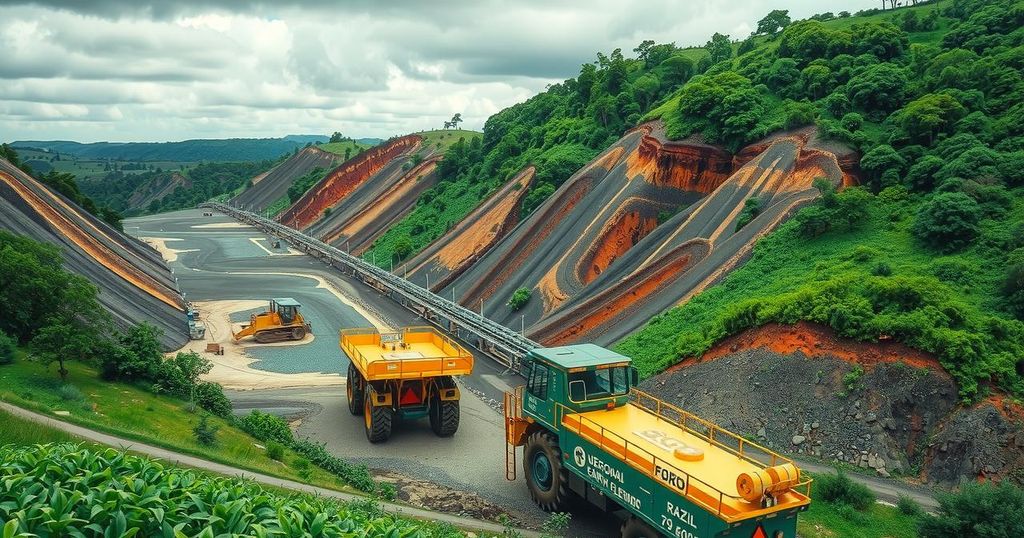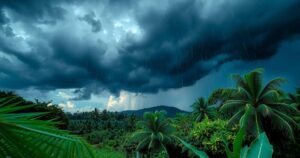Emerging Rare-Earth Plants Outside China: A Shift in Global Supply

The U.S. and Brazil are intensifying efforts to mine and process rare earths amid growing concerns over China’s dominance in the sector. With strategic moves by companies like Aclara Resources, both countries are positioning themselves as key players. Brazil’s vast reserves could be pivotal, despite challenges related to processing costs and mining regulations. The push comes against a backdrop of geopolitical tensions that have prompted manufacturers to seek alternatives to Chinese sources.
In a move that could reshape the global rare earths landscape, countries like the U.S. and Brazil are ramping up efforts to mine and process critical minerals. These elements are vital for electric vehicles (EVs) and smartphones. Notably, this surge in production aims to supply the U.S. market, distancing it from China, which currently dominates the sector, controlling 70% of global rare earths mining and an overwhelming 90% of processing.
Ramón Barúa, the CEO of Aclara Resources in Canada, emphasizes the fierce competition posed by China. His company is working on opening a new rare-earths mine that will support a processing plant planned for construction in the U.S. By August, Aclara is set to make a decision on the specific location of the plant that will separate rare earths into individual elements. Aclara’s strategic partnerships look promising, having already secured an agreement to supply rare earths to VAC, a German firm building a magnet factory in South Carolina.
Recent geopolitical tensions have intensified focus on Brazil’s immense mineral wealth. Following new U.S. tariffs on China, concerns arose when China issued export restrictions on rare-earth materials. This predicament is prompting manufacturers, including Tesla, to seek alternatives. As things stand, some companies are beginning to resume exports of rare earths from China. “Hopefully, we’ll get a license to use the rare-earth magnets,” said Elon Musk during an earnings call.
Brazil boasts the second largest reserves of rare earths in the world, with an estimated 21 million tons according to the U.S. Geological Survey. That’s over a fifth of global reserves and significantly more than the U.S. However, Brazil’s extensive mining regulations and challenges in attracting foreign investment have hindered its potential as a player in the industry.
Cost challenges persist, with mining and processing Brazilian rare earths threefold more expensive than in China. That raises the price for Western buyers, making Brazilian minerals potentially less appealing unless a clear processing method is established. The technological learning curve for mastering rare-earth processing isn’t trivial either.
Brazilians are actively searching for rare earths, even mapping out potential deposits. Alexandre Silveira, the Brazilian Minister of Mines and Energy, pointed out that exploring waste from other mines could uncover useful minerals. “This potential presents a significant opportunity,” he stated.
Only last year, Brazil launched its first large-scale rare-earths mine near Nova Roma, supported by private-equity firm Denham Capital. However, a significant portion of the mine’s output is already contracted to China. In contrast, the U.S. government has invested hundreds of millions to revive its processing plants and magnet factories, following decades of reliance on Chinese sources.
The European Union is similarly working to cut its dependency on China, setting a target to process 40% of its critical materials and limiting imports from any single country.
Aclara’s pilot plant near Goiânia aims to develop the refinement process prior to a larger facility planned for Nova Roma, expected to be operational by 2028. The project will yield rare-earth carbonates, which will then be refined further in the U.S. While Aclara may not compete with China on cost, it is promoting its mining practices as more environmentally sustainable.
Despite Brazil’s mining challenges—with a record marred by incidents like the Vale dam collapse—its regulations are stricter than China’s. Aclara’s planned extraction method is notably less harmful; they aim to extract shallower clays and treat them at their plants, sidestepping the contamination risks associated with traditional methods that utilize ammonium sulfate.
There’s a budding movement to cultivate rare earth production outside of China, particularly in the U.S. and Brazil. As companies seek to secure independent sourcing of these vital materials, the interest stems from both market demands and geopolitical pressures. With significant investments and projects underway, these countries could redefine the landscape of rare earths, potentially easing reliance on China, despite challenges ahead.
Original Source: www.hindustantimes.com







